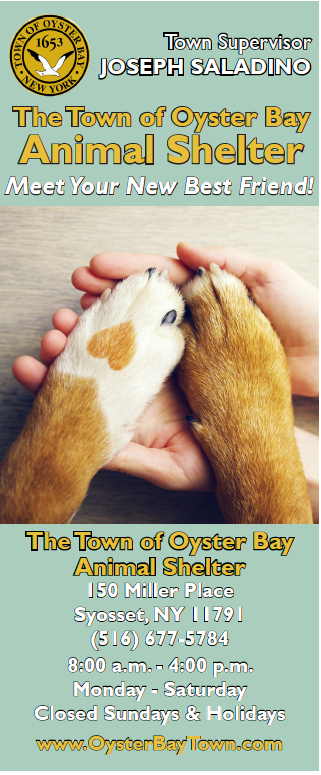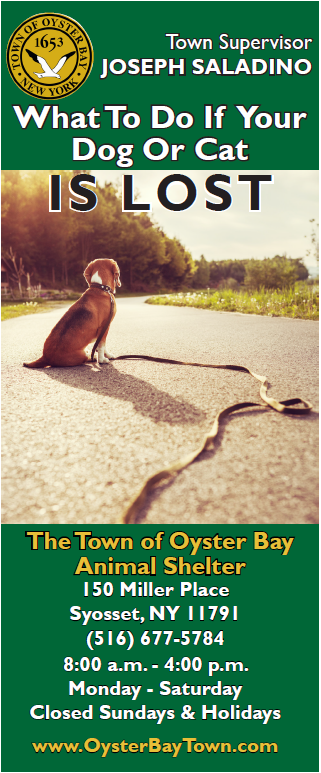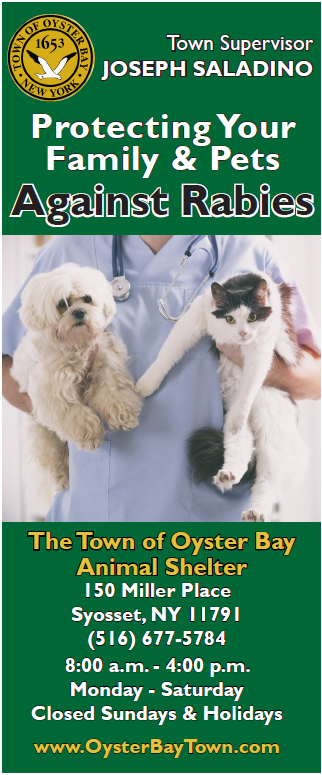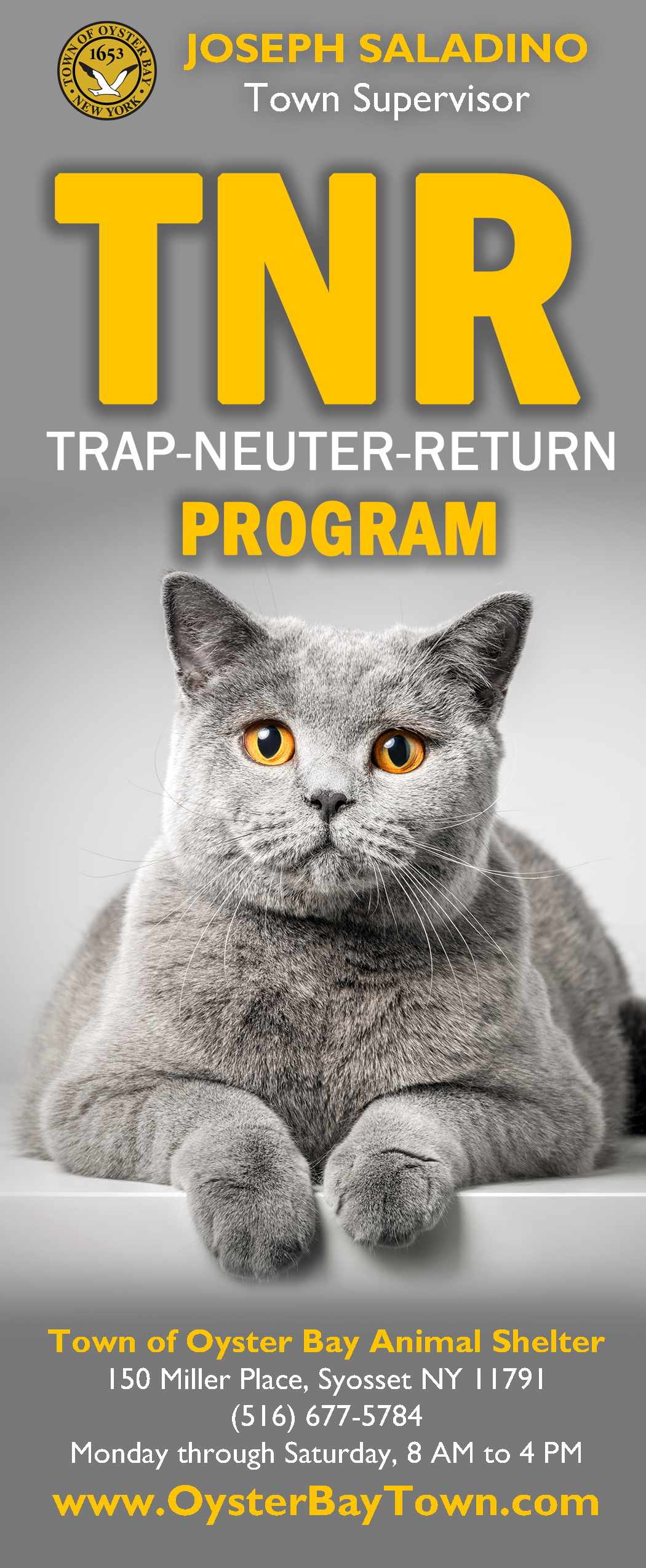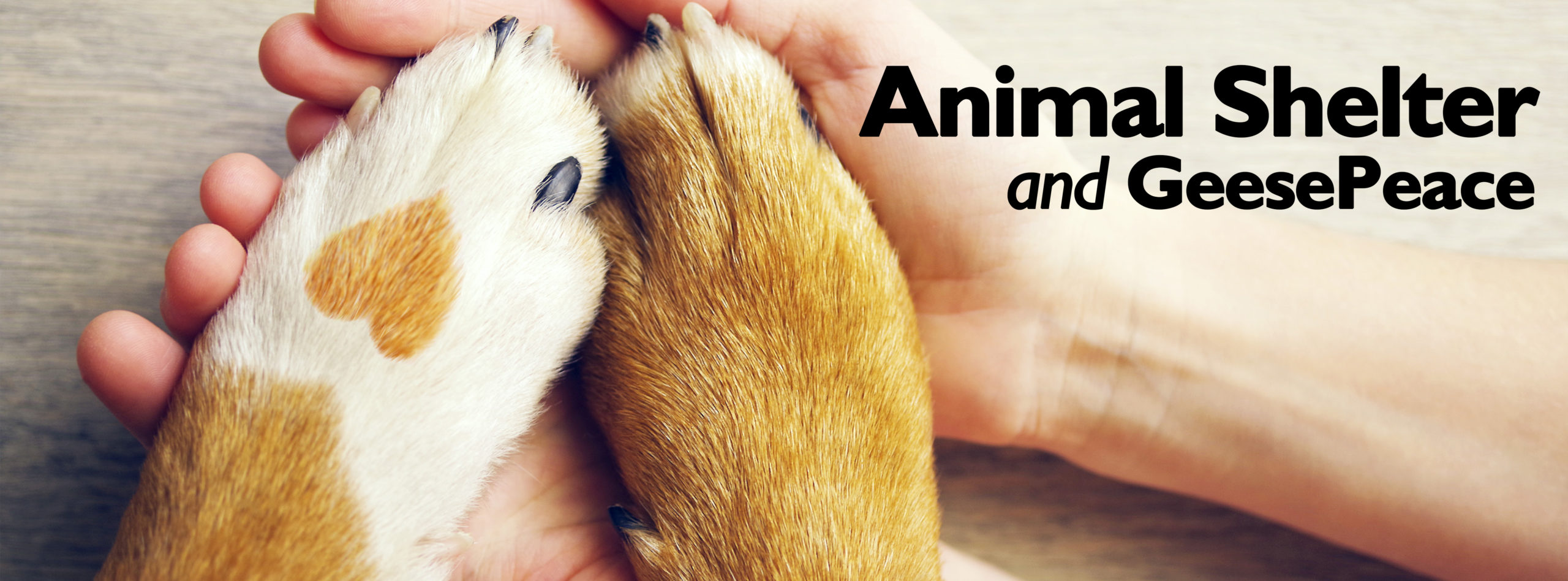
Public Works > ANIMAL SHELTER AND GEESEPEACE
ANIMAL SHELTER
The Town’s Animal Shelter oversees animal adoption and control, and the GeesePeace Program.
Address: 150 Miller Place, Syosset NY 11791
Hours of Operation
Monday – Saturday
8:00 a.m. – 4:00 p.m.
Sunday & Holidays Closed
During regular hours, call (516) 677-5784
After regular business hours, and on Sundays and holidays, residents experiencing animal problems should contact their local police precinct. In an emergency, call 911. They will contact us if they need assistance.
Adopt-A-Pet
- The Town of Oyster Bay Animal Shelter is a state-of-the-art facility built to house animals in a healthy and nurturing environment.
- The “dog only” kennel areas have oversized cages, sheltered out-door areas, and gabled roofs that let in diffused natural light.
- All dogs have access to large outdoor runs to maintain healthy muscle tone.
- Quarantine cages segregate sick animals from the general population. An in-house infirmary, not open to the public, provides space for treatment of ailing shelter residents.
- Cats brought to the shelter are housed in a sound proof area. This stress-free environment consists of twenty-four cages complete with a skylight above.
- All dogs receive “5 in l” and rabies inoculations and all cats are given “4 in l” inoculations before leaving the shelter.
- The entire Animal Shelter enjoys a complete air filtration system which provides air exchanges every fifteen minutes of every day.
- VIEW THE CANINE BEHAVIORAL & ADOPTABILITY POLICE OVERVIEW
- VIEW THE FIRST TIME DOG & PUPPY OWNER BROCHURE PROVIDED BY GIRL SCOUTS
- VIEW THE FIRST TIME CAT & KITTEN OWNER BROCHURE PROVIDED BY GIRL SCOUTS
- VIEW THE NASSAU COUNTY SOCIETY FOR PREVENTION OF CRUELTY TO ANIMALS
ADOPTION FEES
Adoption Fee For Dogs – $80.00 (includes a medical examination, spaying/neutering, rabies vaccination, 5-in-1 shot (where appropriate) and dog license fee)
Adoption Fee For Cats – $84.00 (includes a medical examination, spaying/neutering, rabies vaccination, and 4-in-1 shot (where appropriate).
Surrender Fee For Cats/Dogs – $65.00
Adoption Terminally Ill Dog/Cat – No Fee
Adoption Senior For Seniors – No Fee
LICENSE FEES
Spayed/Neutered Dog License – $10.00
Unspayed/Unneutered Dog License – $15.00
Replacement Tags – $3.00
Senior Rate For All Licensing – $5.00
Federal Laboratory Animal Welfare Act – $100.00
According to New York State law, all dogs must be licensed. A license on a dog will expedite its return to its owner. License applications are available at the Animal Shelter or the Town Clerk’s Office in Town Hall, Oyster Bay or Town Hall South in Massapequa. To have an application mailed to you call (516) 677-5784, (516) 624-6324 or (516) 797-7960.
Visit the Town Clerk page
OTHER FEES
Dog Redemption (1st Offense) – $25.00
Dog Redemption (2nd Offense) – $50.00
Dog Redemption (3rd Offense) – $75.00
Cat Redemption – $10.00
*Plus License Fees if Applicable
Daily Holding Fee (Redeemed Animal) – $5.00 per day
Rabies Shot (Redeemed Animal) – $25.00
Microchip – $25.00
Fecal Test (Redeemed Animal) – $10.00
Flea Treatment (Redeemed Animal) – $10.00
Injured Dogs and Cats
Strays – During business hours residents can make a report to the Animal Shelter. After hours, the police should be notified. Medical attention, if warranted, will be provided by Town-contracted veterinarians. Owners should call their veterinarian or an Emergency Veterinary Service concerning their own dog or cat.
Lost and Found
Lost or found pets or stray dogs should be reported to the Animal Shelter. If your pet is lost, contact the Animal Shelter immediately. If we do not have your pet, we will take all of your information for our lost animal book. The lost animals book is checked by Animal Shelter staff whenever new animals arrive at the shelter. The Town of Oyster Bay Animals Shelter posts all found animals on our Facebook page at Facebook.com/TownOfOysterBay as well as Facebook.com/LostandFoundPetsLongIslandNassauSuffolkCounty.
Report Animal Cruelty
To report animal cruelty please call (516) THE-SPCA / (516) 843-7722.
View the Nassau County SPCA Animal Abuse Registry.
Disaster Preparedness
Have a pet? Have a plan!
Check out the Nassau County SPCA’s tips to keep your pets safe if you have to leave your home in an emergency.
SPECIAL EVENTS
- September is Free Adoption Month!
- Rabies Clinics
- “Seniors for Seniors” Pet Adoption Program
For information call (516) 677-5784. Personnel are available for Animal Shelter tours and/or speakers for your group. Contact the Animal Shelter between 8 a.m. and 3:45 p.m. for further details.
TNR
What is TNR?
The acronym TNR, also known as Trap-Neuter-Return, is a method of humanely trapping feral cats, neutering them, and then returning them to the original environment they were taken from. TNR is widely seen as a more humane and more efficient alternative for animal care and control. The captured feral cats are immediately taken to a veterinary clinic where they are treated by the castration of males and spaying of females. Typical TNR programs generally include vaccinations of certain diseases such as rabies, herpes and calicivirus.
What Are The Benefits of TNR?
- It immediately stabilizes the size of the colony by eliminating the chance of new litters
- Nuisance behavior is reduced, including yowling and fighting that come with mating activity and the odor of spraying males marking their territory
- Lessens the number of kittens and cats flowing into local shelters, which results in lower euthanasia rates
- Allows cats to live out their lives while minimizing a possible negative impact on the cat population near you
Oyster Bay Animal Control TNR Surgical Unit
In an effort to control the population and health of feral cats within the Town of Oyster Bay, the Town has its own Trap-Neuter-Return Program. Supervisor Saladino stated, “With Nassau County being declared a rabies county, these cats pose not only a nuisance, but a public health risk.” With that being told, TNR is the most effective and humane way to deal with these types of issues.
GEECEPEACE PROGRAM
The Town’s GeesePeace program works with our highly trained Border Collies to humanely reduce the local geese population while encouraging them to migrate to areas that allow us to peacefully co-exist. The public can help the effort by not feeding geese (and other wildlife). Humans feeding geese are a root cause of problems with geese. People feed geese bread, crackers, and other processed foods that are unhealthy for them and can lead to bird diseases. Feeding geese causes them to be aggressive and must be eliminated before they will leave. The Town of Oyster Bay recognizes that there is a great conflict with geese overpopulation and their effect on the quality of life of our residents. GeesePeace works to help control the rapidly increasing Canada Geese population in the area.
Canada Geese are not only a nuisance to the public, they have become a threat to the local ecology. The first strategy of population stabilization is a process known as “egg-oiling.” Egg oiling is effective because it contributes to the long term reduction in overall numbers of the birds and reduces adult loyalty to one site. GeesePeace personnel first test the eggs to see if they are developing embryos, in which case they return them to the nest. (They put the egg into a bucket of water. If it floats, that means it has an air sack and it contains a developing embryo.) The Town of Oyster Bay has oiled over 5,000 eggs. This translates to over 50,000 fewer geese over a period of 8 years.

